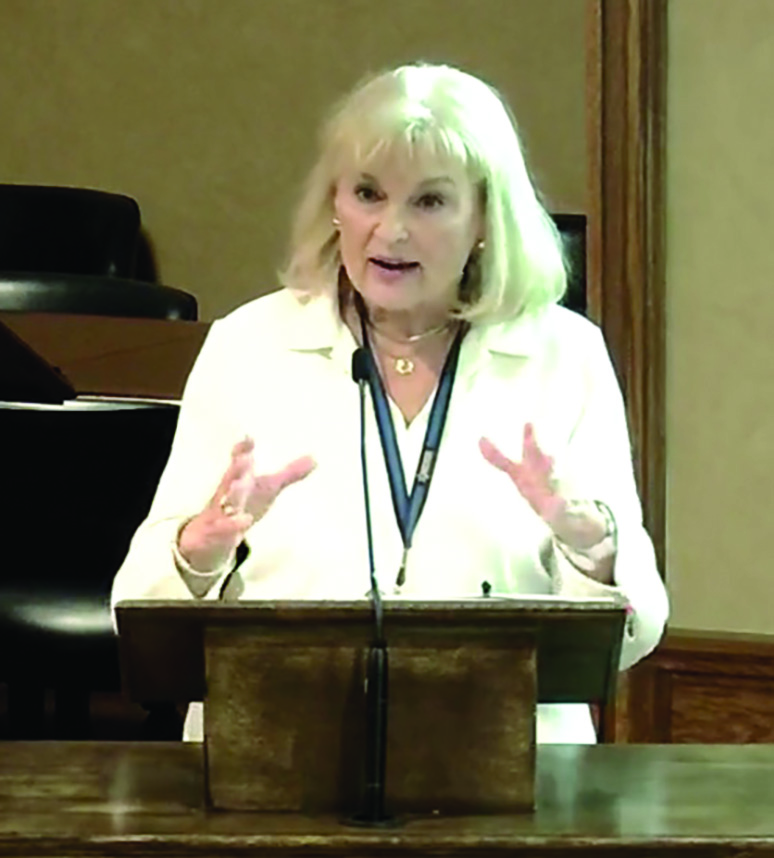The distraught young woman sitting across from Sandra Brazil-Hamilton that day anxiously expressed her fears and doubts.
She faced a minor criminal charge, suffered from a mental illness and had little hope of finding a home or a job.

📷 Smith County video
Brazil-Hamilton did what she does best: She listened and then she got busy developing a plan and connecting her with organizations that could help. The woman returned later for another meeting to discuss her progress.
“She comes back and she’s all excited about her life. She’s lucid,” Brazil-Hamilton recalled. “I mean, that’s pretty amazing. I have this (result) over and over and over.”
As Smith County’s jail diversion coordinator, Brazil-Hamilton is a crucial link in a system that often fails those with mental health issues, intellectual developmental disabilities and substance use disorders.
Her employment was made possible by a $171,000 grant from the Texas Judicial Commission on Mental Health. Justices from the Texas Supreme Court and the Texas Court of Criminal Appeals created the pilot program with hopes of improving the lives of affected individuals.
“We are hopeful … that we can develop a very, very effective program to help divert those facing mental health issues from our jail when appropriate,” County Judge Nathaniel Moran said.
Brazil-Hamilton updated Moran and the rest of the commissioner’s court on the program’s progress in Smith County during a Tuesday presentation.
She said the program benefits a community by reducing the cost of housing certain inmates, but more importantly, helps people. Brazil-Hamilton said she battles the stigma toward mental illness every day.
“Something that’s never talked about, about mental illness and substance use is that people get well,” she said. “Given the right help, the right assistance, the right net of support, they get well, and they become productive citizens. So, I saw in this grant that opportunity to make that happen.”
Brazil-Hamilton, who had worked 23 years at the East Texas Medical Center Behavioral Health Center, came out of retirement to accept the coordinator’s position with Smith County in September.
“This is a real passion for me,” she said.
The only employee in her office, Brazil-Hamilton said she has day-to-day responsibility for 40 to 50 people with various levels of needs. She works closely with the county’s probation department, courts, sheriff’s department, attorneys and a network of other professionals.
She often meets inmates at the jail, attends their court appearances, works to ensure they receive their prescribed medications and that they have legal representation.
She said she also devises individualized plans for treatment and support and helps with homelessness, job searches and continued treatment.
“We’re doing better at getting these people the proper meds again. We’re not perfect, but we’re working on these issues,” she said.
Brazil-Hamilton said she also works with a variety of organizations in the Tyler community who can provide needed services.
“I have all these wonderful resources in our community … and let me tell you, people are always saying … that we don’t have enough resources,” she said. “We have a ton of resources. You just have to find them.”
She applauded county officials in a variety of departments for their cooperation in getting this program off to a good start. She is hopeful that after the two-year grant expires, the county will have built the foundation for a permanent program.
“It takes all this collaboration to make this work, and I hope we will continue to pull this together,” she said. “It takes a village. It isn’t just me.”
Love what you're seeing in our posts? Help power our local, nonprofit journalism platform — from in-depth reads, to freelance training, to COVID Stories videos, to intimate portraits of East Texans through storytelling.
Our readers have told us they want to better understand this place we all call home, from Tyler's north-south divide to our city's changing demographics. What systemic issues need attention? What are are greatest concerns and hopes? What matters most to Tylerites and East Texans?
Help us create more informed, more connected, more engaged Tyler. Help us continue providing no paywall, free access posts. Become a member today. Your $15/month contribution drives our work.







